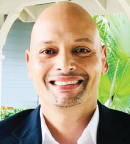Six years ago, I was 38 years old and, like many young people, took life for granted. I had two young daughters, ages 7 years and 4 months, and a wife I adored. And, except for a nagging pain on the left side of my abdomen, I was blessed with good health. Then, suddenly, the pain became so unbearable, my wife had to drive me to the emergency room. A quick physical examination found that my spleen was twice its normal size, and after spending 3 days in the hospital to undergo additional tests and a biopsy of my spleen, it was determined I had stage IV non-Hodgkin lymphoma.

I’m grateful that research in this exciting era of gene therapy has given me and other patients a second chance.— Dimas Padilla
Tweet this quote
Everything in my life changed that day, but I didn’t fully appreciate just how much until many years later. My oncologist prescribed the standard-of-care chemotherapy regimen of R-CHOP (rituximab [Rituxan], cyclophosphamide, doxorubicin, vincristine, and prednisone), and within a few months I was in remission. But the reprieve from cancer was short-lived. Just a year later, the cancer recurred and was progressing rapidly.
I was told I needed an autologous bone marrow transplant, and preparation for it was tough. I was in the hospital for a month undergoing high-dose chemotherapy to eradicate the malignant cells and then another 3 weeks in recovery following the transplant. But the treatment, as grueling as it was, was worth it. For the next 2 years, I remained cancer-free and was able to resume my career in real estate and enjoy my family.
Becoming a Cancer Warrior
During this time, my attitude about cancer changed. I became a cancer warrior and was no longer afraid. Instead, I felt gratitude that I was the one in our family to get the disease. It would have been unbearable if cancer had claimed one of my children or my wife or mother. It was right that cancer had picked me. I could take whatever plans it had for me.
I was still feeling so well in the early spring of 2016; we decided to take a much-needed family vacation, but almost immediately upon returning home, I was shocked to see a golf ball–sized tumor growing out of the left side of my neck. The tumor had grown so big, so fast, it was nearly choking me. I knew even before the biopsy confirmed my worst fear that I had relapsed again. Despite more cycles of chemotherapy, the cancer was advancing.
I had exhausted all my treatment options, said my oncologist, and, at best, I had about 6 months to live.
Taking a Chance to Live
The news was devastating, but 2 days later, just as I was starting to adjust to my prognosis, my oncologist called to tell me about a clinical study, ZUMA-1, evaluating a chimeric antigen receptor (CAR) T-cell therapy called axicabtagene ciloleucel (Yescarta), underway at a nearby major cancer center. “Get there as soon as you can,” he urged. “There is one spot open.” I believe that call saved my life.
Even though I knew the therapy was experimental, I didn’t hesitate for a minute to try it. I decided to do whatever it took to stay alive. I wanted to see my children grow into adulthood and wanted to grow old with my wife.
Two days after the infusion of the CAR T-cell therapy, I could feel my tumors shrink. I was thrilled, but soon after, I spiked a fever of 105ºF and spent the next 3 days in the intensive care unit, awake but unresponsive to questions and in a state of confusion. Gradually, I recovered, although, even now, I’m plagued with side effects from the therapy, including tremors and cramping in my hands, weight loss, fatigue, and insomnia. But I’ll take the side effects: I’m alive, and nearly 2 years after my CAR T-cell infusion, I remain cancer-free.
[Editor’s Note: On October 18, 2017, the U.S. Food and Drug Administration approved axicabtagene ciloleucel in the treatment of adults with certain types of relapsed non-Hodgkin lymphoma, including diffuse large B-cell lymphoma, primary mediastinal large B-cell lymphoma, and transformed follicular lymphoma.]
Getting a Second Chance
Living as a cancer survivor has become my new normal, and I’m still adjusting to the life-altering changes the disease has brought me over the past 6 years. I’m still closely monitored every 3 months for recurrence and treatment side effects, so cancer is ever- present in my life, but that’s okay.
There was a time when I was out of options and out of hope, and I’m grateful that research in this exciting era of gene therapy has given me and other patients a second chance. I’m proud to have been part of the ZUMA-1 trial and to have made a contribution to such important research.
I live my life differently now. I have slowed down, appreciate the simple things in life I took for granted before my cancer diagnosis. I know it sounds cliché, but I actually do take time now to stop and smell the roses. I spend quality time with my children, wife, family, and friends. They have given me their full support since my diagnosis, and I love them.
Cancer taught me to appreciate what really matters in life. I won’t waste my second chance. ■
Mr. Padilla lives in Orlando, Florida.
Editor’s Note: Columns in the Patient’s Corner are based solely on information The ASCO Post received from the survivors interviewed and should be considered anecdotal.

